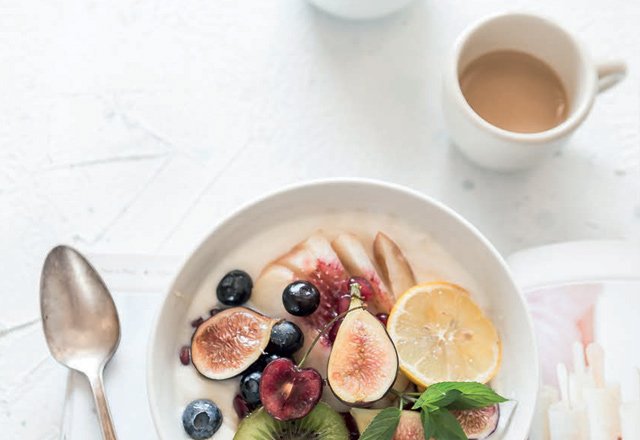It is said that the kitchen is the heart of the home. It’s the space where we prepare the food that nourishes our loved ones and ourselves. It’s the space where we teach our children about nutrition and cooking. But most of all, the kitchen is the sacred space where many of our earliest memories are born; from the smell of fresh fruit, the aroma of baked banana bread or the hypnotic waft of a Sunday night roast. In our modern world, it’s increasingly common to spend less time in the kitchen and more time on the couch, but by reclaiming the kitchen as the temple of the home, we’re able to view cooking as a life-giving activity that elevates the quality of the food we cook and consume.
THE SPIRIT OF FOOD
Since the dawn of time, food has been an integral part of spiritual life. In ancestral traditions, food was connected with sacred ceremonial processes such as song, storytelling and drumming.
Cooking was seen as a shared activity that united a community, as families joined to prepare and share their meals. And while we may not live in a tribal culture, if we purposely cultivate a connection between our cooking spaces and the joy of food, we can live the ancient truth that the cooking and sharing of food is a celebration of life.
A 2016 national Omnipoll survey by the Dietitians Association of Australia (DAA) found that around one in 10 Australians currently eat out or buy take-away three or more times a week.
“These days, we are often in a hurry and can fall into a habit of eating take-away foods or snacking on unhealthy food and drinks,” says accredited practising dietitian and spokesperson for the DAA Professor Clare Collins. “Cooking at home is one way to pack a punch when it comes to keeping your weight in check, and improving your health and that of your family.”
“Our modern lifestyles have separated us from the most basic involvement in our day-to-day needs, and part of coming back to ourselves, nature and spirituality is through nourishing ourselves, and this happens in the kitchen,” says Bahareh Hosseini, educator with Wise Earth Ayurveda and Chinese medicine practitioner (claritywellness.co).
“According to ancient Vedic tradition, the kitchen is the most sacred space in the house because that’s where health, longevity and nourishment are restored to the family, and through cooking practices we’re able to get back in touch with those elements,” says Hosseini. “It’s also a very divine feminine aspect of spirituality to be in the kitchen and involved in cooking.”
So, how do we begin reclaiming our kitchen as a sacred space and the act of cooking as a spiritual experience?
ALLOW THE ENERGY TO FLOW
The kitchen space should be a comfortable, welcoming and hospitable environment that inspires you to prepare and eat food. “We want to have enough openness to allow the energy to flow; therefore, begin by decluttering every nook and cranny in the kitchen,” says Hosseini.
Reorganise storage spaces by going through draws, cupboards and jars, and get rid of what you haven’t used in a while by donating or composting. Simplify your equipment by keeping just two or three good-quality stainless-steel and enamel pots and pans, a cast-iron skillet and a stainless-steel pressure cooker. “Cooking with utensils made from a variety of materials all lend different energies to the food,” says Hosseini.
To keep things as natural as possible, prioritise using natural materials, such as clay and wooden bowls, ladles,
utensils, bamboo baskets, glass jars and cups, and make sure you have a mortar and pestle to grind your spices.
“In terms of spices, you don’t want to be holding on to too many for months and years. Stock your pantry with the basic spices – such as cumin, coriander, cardamom, black mustard and fennel seeds – and use them to make other versions of spices. This way, you clear the space of small jars but still have the same variety,” she says.
Conversely, we want to stop hoarding processed or frozen food, so keep bringing a variety of organic, locally grown fresh fruits and vegetables into the home and re-stock every couple of days. “Just buy what you need for a few meals, use it, and then repurchase,” says Hosseini. And to further improve your kitchen’s energy, use natural products to clean – mix water, white vinegar, a drop of lavender and two drops of tea tree essential oil – scrub the surfaces and you’re ready to begin cooking.
COOK MINDFULLY
Our state of mind at the time of cooking is important, as our energy directly transmits to the foods we are handling. Before you handle your food, take a few minutes to settle your whole system. You may choose to meditate, focus on deep breathing, listen to soothing music, burn some incense, pray, or repeat a mantra, and observe the quieting of the mind. “Having a small ritual or altar in place, conducive to your tradition or religious beliefs, signals your transition to cooking and reinforces the positive energies affecting the food but also your digestion,” says Hosseini.
“The digestive process actually begins in the body from the moment we buy our produce from the store or pick it from our vegetable garden,” she says. “The digestive fire, known as agni in Sanskrit – responsible for properly assimilating what we eat – ignites, helping us make intuitive choices of what foods are right for us, and continues right through with cooking and of course eating. Our body is essentially digesting the whole process.”
Part of cooking mindfully also involves stimulating all five senses, which focus us in the present moment and awaken our spirit to joy. Use your hands as much as possible as the sense of touch will allow you to experience the textures, extend loving energy to the food, which draws down from the heart centre and out through our hands to the food, and by using a very sharp knife to cut through the raw foods it enhances the mindfulness component, as it’s a metaphor symbolising a sharp mind; inhaling the beautiful aroma of fresh ingredients or of foods simmering satisfies the sense of smell; the sound of roasting spices as they pop soothes our hearing; taking in with the eyes the rainbow of colourful vegetables revitalises the sense of seeing; and tasting all those mouthwatering flavours opens the appetite and promotes satisfaction.
//Words written by Elena Iacovou




